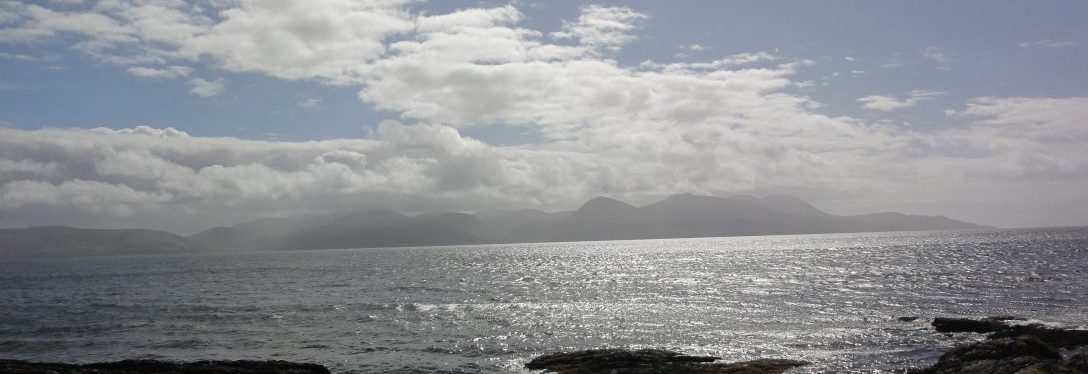Open Access
- Mößner, Nicola; Erlach, Klaus (eds.): Kalibrierung der Wissenschaft. Auswirkungen der Digitalisierung auf die wissenschaftliche Erkenntnis. Bielefeld: transcript 2022.
- Open access file: Chapter 4 “The epistemic status of scientific visualisations” of “Visual Representations in Science – Concept and Epistemology” (Routledge 2018, pp. 209-332) DOI: 10.18154/RWTH-2018-224527
Licence: CC-BY 4.0
Please follow this link!
Preprints
For preprints of my scientific papers see my profile on PhilPapers.
Reviews of my work
- De Haro, Sebastian (forthcoming): Discussion Note on Visual Representations in Science. In: Grazer Philosophische Studien, https://doi.org/10.1163/18756735-000107.
- Schöttler, Tobias (2013): Dimitri Liebsch and Nicola Mößner (eds): Visualisierung und Erkenntnis. Bildverstehen und Bildverwenden in Natur- und Geisteswissenschaften. Journal for General Philosophy of Science 44: 401–404. https://doi.org/10.1007/s10838-013-9237-1.
Publications
Books
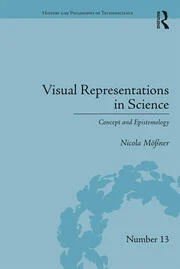
Visual Representations in Science – Concept and Epistemology. London and New York: Routledge 2018, [DOI: 10.4324/9781315108902].
Abstract: Visual representations (photographs, diagrams, etc.) play crucial roles in scientific processes. They help communicating research results and hypotheses to scientific peers as well as to the lay audience. In genuine research activities they are used as evidence or as surrogates for research objects that are otherwise inaccessible. Despite their important functional roles in scientific practices, philosophers of science neglected visual representations in their analyses of epistemic methods and tools of reasoning in science. This book is meant to fill this gap. It presents a detailed investigation into the concept and the epistemology of visual representations in science. [further information]
- Paperback Edition 12/2020.
- ch. 4 “The epistemic status of scientific visualisations” available as open access (CC-BY 4.0)
https://publications.rwth-aachen.de/record/724068/files/724068.pdf

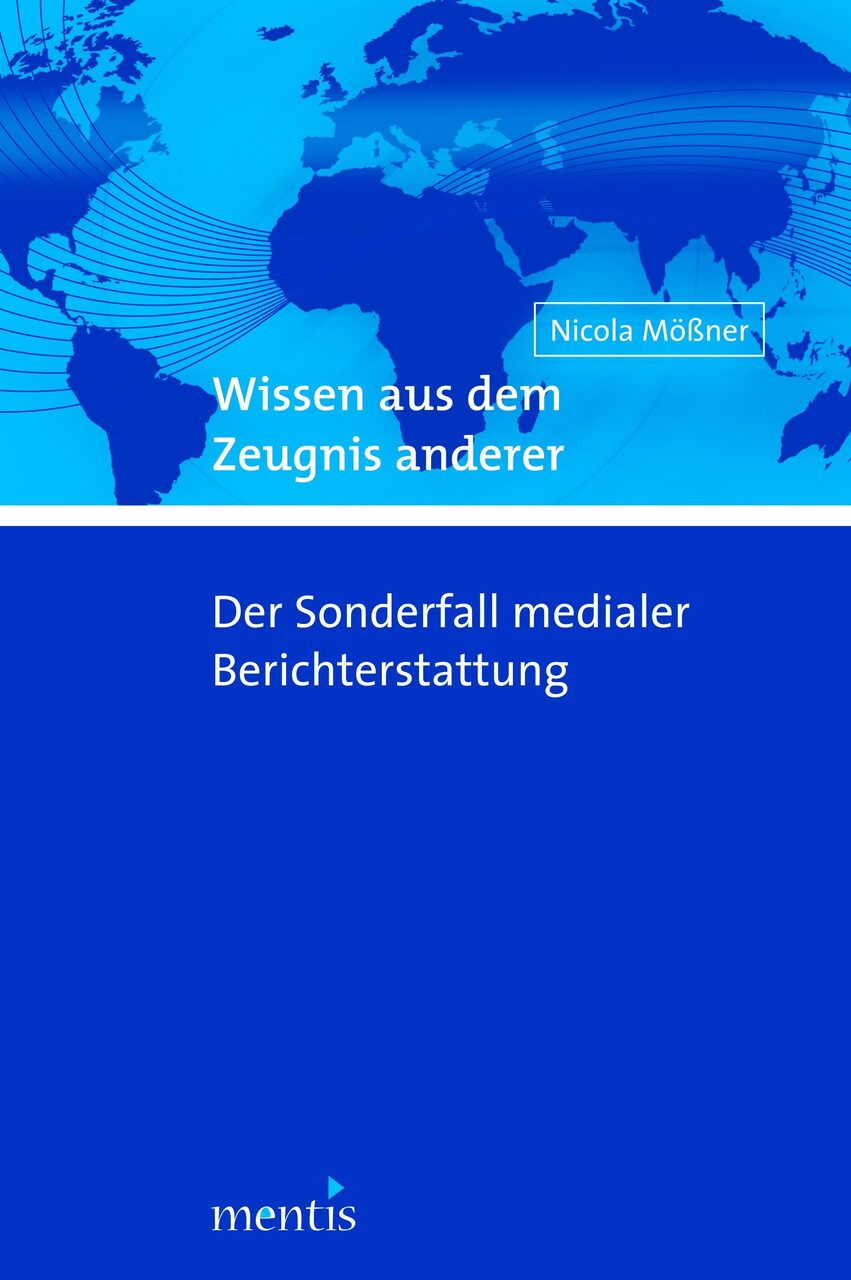
Wissen aus dem Zeugnis anderer – der Sonderfall medialer Berichterstattung. Paderborn: mentis 2010. [further information and eBook]
Abstract: When addressing the question of the sources of our knowledge, it becomes apparent that undoubtedly a significant portion of our understanding of the world is derived from the testimony of others. In the current epistemological discourse, it is not contested that the testimony of others contributes to the formation of our knowledge. However, what remains disputed is whether referencing the origin of such beliefs sufficiently contributes to their justification. This book provides a systematic insight into the various epistemological positions within this debate, presenting and critically discussing both classical approaches and newer developments. Moreover, the concept of testimony itself, as an epistemically functional term, is thoroughly analyzed. Building on the findings of the systematic section of the book, a case study on the reporting by Tagesschau then closely examines a particular instance of testimony, which, surprisingly, has played a minor in the existing epistemological debate: media reporting.
published in German!
[Wendet man sich der Frage nach den Quellen unseres Wissens zu, so muss man feststellen, dass wir zweifelsohne einen großen Teil unseres Wissens über die Welt aus dem Zeugnis anderer gewinnen. In der gegenwärtigen erkenntnistheoretischen Diskussion wird nicht in Frage gestellt, dass das Zeugnis anderer zur Genese unseres Wissens beiträgt. Umstritten ist dagegen, ob die Anführung des Ursprungs solcher Überzeugungen auch zu deren Rechtfertigung in hinreichendem Maße beiträgt. Dieses Buch bietet einen systematischen Einblick in die verschiedenen epistemologischen Positionen dieser Debatte – sowohl klassische Ansätze als auch neuere Entwicklungen werden vorgestellt und kritisch diskutiert. Darüber hinaus wird der Zeugnisbegriff selbst – als epistemisch funktionaler Begriff – eingehend analysiert. Aufbauend auf den Untersuchungsergebnissen des systematischen Teils des Buches wird dann in einer Fallstudie zur Berichterstattung der Tagesschau ein Sonderfall des Zeugnisses anderer genauer in den Blick genommen, der in der bisherigen epistemologischen Debatte erstaunlicherweise nur eine untergeordnete Rolle gespielt hat: die mediale Berichterstattung.]
Edited books
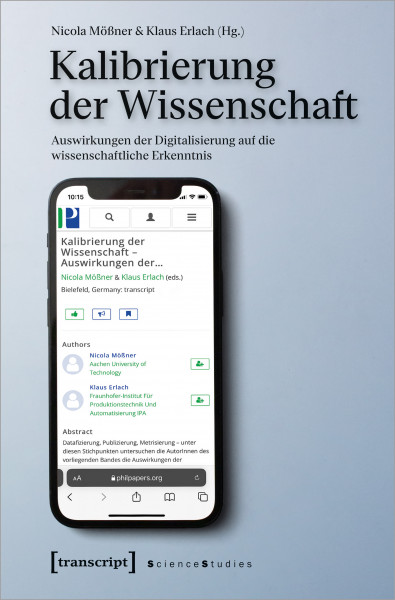
Mößner, N. / Erlach, K. (eds.): Kalibrierung der Wissenschaft – Auswirkungen der Digitalisierung auf die wissenschaftliche Erkenntnis. Bielefeld: transcript 2022, [DOI: 10.14361/9783839462102].

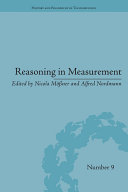
Mößner, N. / Nordmann, A. (eds.): Reasoning in Measurement. London and New York: Routledge 2017.
Paperback Edition 2018. [further information]
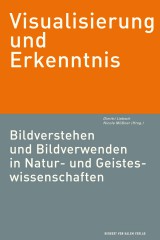
Liebsch, D. / Mößner, N. (eds.): Visualisierung und Erkenntnis. Bildverstehen und Bildverwenden in Natur- und Geisteswissenschaften. Cologne: Herbert von Halem Verlag 2012. [further information]
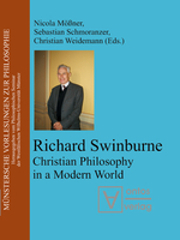
Mößner, N. / Schmoranzer, S. / Weidemann, Ch. (eds.): Richard Swinburne. Christian Philosophy in a Modern World. Frankfurt, Paris, Lancaster, New Brunswick: ontos Verlag 2008, [DOI: 10.1515/9783110326161].
Articles (selection)
- “Sucht oder Autonomie? – Neue ExpertInnen im Netz”. In: Philosophische Digitalisierungsforschung. Verantwortung, Verständigung, Vernunft, Macht, hrsg. von Adolphi, R.; Alpsancar, S.; Hahn, S. and Kettner, M., Bielefeld: transcript 2024, pp.197-217. [https://www.transcript-verlag.de/978-3-8376-7497-2/philosophische-digitalisierungsforschung/?number=978-3-8394-7497-6].
- “Thought Styles”. In: Elgar Encyclopedia of Interdisciplinarity and Transdisciplinarity, ed. by Darbellay, F., Edward Elgar Publishing 2024, pp. 524-528, [DOI: 10.4337/9781035317967.ch115].
- “Werte, Wahrheit, Wissenschaft”. In: Umstrittene Wahrheit(en). Zur Wahrheitsfrage in Philosophie und Religion, ed. by Rothenbusch, R. and Wiertz, O., Münster: Aschendorff Verlag 2023, pp. 89-122.
- Die Pest in Zeiten von Corona – Philosophie und Literatur bei Albert Camus. In: Philokles. Zeitschrift für populäre Philosophie 25, May 2023, pp. 4-32. [https://philoklesonline.files.wordpress.com/2023/06/philokles25_web.pdf]
- “Streitkultur? – Expertenmeinungen in der Pandemie und die Rolle der PhilosophInnen”. In: Wissensproduktion und Wissenstransfer unter erschwerten Bedingungen. Der Einfluss der Corona-Krise auf die Erzeugung und Vermittlung von Wissen im öffentlichen Diskurs, ed. by Hauswald, R. and Schmechtig, P., Baden-Baden: Karl Alber 2023, pp. 189-217.
- Databases, science communication and the division of epistemic labour. In: Axiomathes, Vol. 32 (Suppl 3), 2022, 853–870, [DOI: 10.1007/s10516-022-09638-y].
- “Wissenschaft in ‚Unordnung‘? – Gefiltertes Wissen und die Glaubwürdigkeit der Wissenschaft”. In: Kalibrierung der Wissenschaft – Auswirkungen der Digitalisierung auf die wissenschaftliche Erkenntnis, ed. by Mößner, N. and Erlach, K., Bielefeld: transcript 2022, pp. 103-136.
- “Fotografie: Moralischer Blick oder ästhetische Distanz?”. In: Kunst und Moral. Eine Debatte über die Grenzen des Erlaubten, ed. by Behrendt, J. H. and Steinbrenner, J., Berlin et al.: de Gruyter 2022, pp. 219-242, [DOI: 10.1515/9783110731354-011].
- “Das Zeugnis anderer”. In: Handbuch Erkenntnistheorie, ed. by Grajner, M. and Melchior, G., Stuttgart: Metzler 2019, pp. 136-144, [DOI: 10.1007/978-3-476-04632-1_18].
- Trusting the Media? TV News as a Source of Knowledge. In: International Journal of Philosophical Studies, Vol. 26(2), 2018, S. 205-220, [DOI: 10.1080/09672559.2018.1450079].
- Mößner, N.; Kitcher, P.: Knowledge, Democracy, and the Internet. In: Minerva, Vol. 55(1), 2017, pp. 1-24, [DOI: 10.1007/s11024-016-9310-0].
- Scientific Images as Circulating Ideas – An Application of Ludwik Fleck’s Theory of Thought Styles. In: Journal for General Philosophy of Science, Vol. 47(2), 2016, pp. 307-329, [DOI: 10.1007/s10838-016-9327-y].
- Visual Information and Scientific Understanding. In: Axiomathes, Vol. 25, 2015, pp. 167-179, [DOI: 10.1007/s10516-014-9246-7].
- Photographic Evidence and the Problem of Theory-Ladenness. In: Journal for General Philosophy of Science, Vol. 44(1), 2013, pp. 111-125, [DOI: 10.1007/s10838-013-9219-3].
- Thought Styles and Paradigms – a Comparative Study of Ludwik Fleck and Thomas S. Kuhn. In: Studies in History and Philosophy of Science, Vol. 42(2), 2011, pp. 362-371, [DOI: 10.1016/j.shpsa.2010.12.002].
- Testimoniale Akte neu definiert – Ein zentrales Problem des Zeugnisses anderer. In: Grazer Philosophische Studien, 80/2010, pp. 151-178, [DOI: 10.1163/18756735-90000875].
Download
Download complete list of publications!
